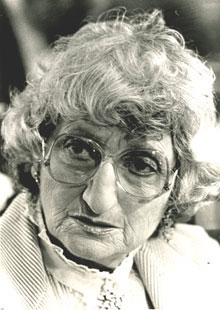Flash version here.
 On September 27, 2011,
Maryvonne Kendergi, a beacon of modern music in Quebec known as “the
grandmother of composers” or the “great lady of music,” gently
passed away at the age of 96.
On September 27, 2011,
Maryvonne Kendergi, a beacon of modern music in Quebec known as “the
grandmother of composers” or the “great lady of music,” gently
passed away at the age of 96.
The title of Kendergi’s memoirs,
La musique en partage, aptly describes the personal and professional
life of the composer, who used her talents in the service of those close
to her and shared her savings with those less fortunate.
Her accomplishments demonstrated
her exceptional gifts as a presenter and organizer. The broadcast series
Festivals européens (1956-1963), where she reported on works from
the great festivals of Europe, opened the doors to her brilliant career
in radio. In 1961, with Pierre Mercure and Serge Garant, she organized
the Semaine internationale de musique actuelle.
At the instigation of Pierre Mercure,
she helped establish the Société de musique contemporaine du Québec
in 1966 alongside Serge Garant, Jean Papineau-Couture, Hugh Davidson
and Wilfrid Pelletier. In 1967, she joined the University of Montreal’s
Faculty of Music. In 1970, she created and organized the ‘Musialogues.’
In 1980, she readily lent her support to the Association pour l’avancement
de la recherche en musique du Québec (ARMuQ,.now known as
the Société québécoise de recherche en musique or SQRM), becoming
its first president. She also donated the Maryvonne Kendergi fund to
the UdeM, from which scholarships are awarded annually to musicology
students.
Of Armenian origin, she was born
during the First World War, on August 15, 1915 in Aintab (Gaziantep),
on the southern border of modern Turkey. Survivors of genocide, her
family moved to Aleppo, Syria. In 1928, the young Maryvonne completed
her primary schooling with the Sisters of the Franciscan Missionaries
of Mary, where she studied piano, discovering her musical vocation.
She went to France to pursue her music studies at the École Normale
de Musique in Paris with Nadia Boulanger. There, she completed a teaching
degree (1933) before returning to the Middle East to try out a career
as a concert artist (1933-1937).
During the war, she helped prisoners
and refugees, organized food banks, and supported the rescue networks
for Jewish children. After the war, thanks to the friendships she had
developed during this period, she was entrusted with the organization
and management of cultural activities at the Cité Universitaire de
Paris (1945-1952). While there, she rubbed shoulders with composers
who introduced her to avant-garde music.
She left Gravelbourg, Saskatchewan
after four years in June 1956 to pursue a concert career in Paris, little
knowing that as she passed through Montreal, Marc Thibault, director
of the French radio network, would succeed in keeping her there with
this prescient statement: “Would you like to do what you are made
to do?”
Wherever she went she carried with
her a deep attachment to her Armenian roots, a steadfast appreciation
for France, the country that gave her its language and culture, and
an unequivocal allegiance to Quebec, where she eventually settled.
Translation: Lynn Travers
Version française...

